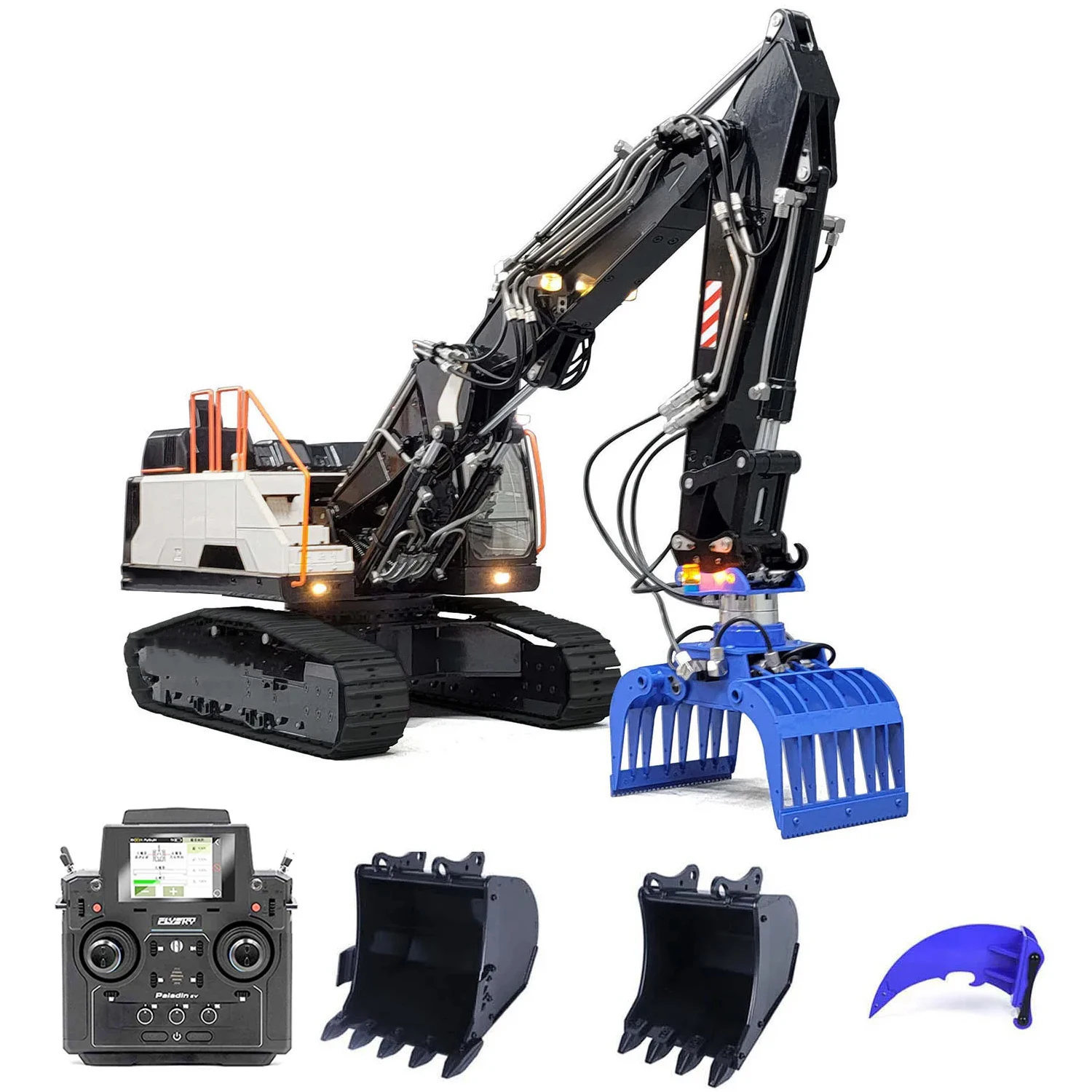Understanding How Excavator Works and Its Influence On Effectiveness
Excavators play an essential role in building and mining operations, counting on a complex interaction of mechanical and hydraulic systems. Their capacity to perform a selection of jobs hinges on both their layout and the modern technology incorporated within. Understanding these parts can greatly influence functional efficiency and efficiency. As developments remain to reshape the industry, one must take into consideration how these changes will certainly influence future practices and performance.
The Essentials of Excavator Mechanics

The Role of Hydraulic Equipments in Excavators
At the heart of excavator operation exists the hydraulic system, which plays a crucial duty in powering the device's features and motions. This system uses pressurized hydraulic fluid to move energy, enabling different actions such as moving, digging, and training. By taking advantage of the principles of hydraulics, excavators can perform tasks with amazing accuracy and pressure, improving total operational efficiency.The hydraulic system contains crucial elements, including cyndrical tubes, valves, and pumps, which collaborate to manage the flow and instructions of the fluid. When the operator involves the controls, the hydraulic liquid is guided to certain cyndrical tubes, translating the operator's commands into physical activity. This device permits smooth and receptive activities, which are vital in construction and excavation atmospheres. double e volvo rc excavator. The efficiency of the hydraulic system directly impacts the productivity and flexibility of the excavator, making it a vital element in contemporary excavation processes
Key Parts of an Excavator
Comprehending the essential components of an excavator is vital for realizing exactly how this powerful device operates. An excavator contains numerous substantial aspects, including the undercarriage, house, arm, boom, and container. The undercarriage gives stability and movement, often featuring wheels or tracks to browse numerous terrains. The house consists of the engine and hydraulic systems, permitting the operator to manage movement and power the maker. The boom extends from the residence, allowing vertical reach, while the arm links to the container, promoting digging and training operations.Additionally, the taxi houses the operator, equipped with controls for accurate maneuvering. Each of these parts plays a crucial role in the excavator's general performance, adding to its performance and performance on construction sites. Understanding these parts assists in enhancing and preserving excavator efficiency, making certain jobs are finished safely and successfully.
Attachment Flexibility and Its Benefits
Attachment adaptability is an essential facet of excavators, making it possible for operators to switch over in between numerous tools customized for details jobs. This versatility not just enhances job effectiveness however likewise adds to cost-effectiveness by decreasing the demand for numerous devices. Understanding the different sorts of attachments offered can substantially influence the total performance and performance of an excavator on job sites.
Sorts of Add-ons
While excavators are primarily acknowledged for their digging capacities, their real adaptability depends on the wide array of accessories available. These accessories boost the excavator's performance, enabling it to perform various tasks beyond excavation. Usual accessories include pails (for excavating and scooping), hydraulic thumbs (for understanding products), and augers (for piercing openings) Grapples are utilized for relocating and dealing with debris, while rippers can separate hard surfaces. Other specialized attachments, such as plates and plows, allow excavators to adjust to details work demands. This diversity not just enhances the equipment's utility throughout various markets, including demolition, landscape design, and building and construction, however also allows drivers to customize their devices to meet particular job needs effectively.
Raised Task Effectiveness
Making the most of work effectiveness is a key benefit of using different excavator accessories. Various accessories allow an excavator to do numerous tasks without requiring to switch equipment, conserving valuable time and labor. For example, making use of a hydraulic hammer can damage concrete while a bucket add-on can excavate soil, making it possible for a seamless operations. This convenience reduces downtime linked with tools modifications and enhances productivity on-site. Additionally, specialized accessories boost precision in tasks such as grading or landscaping, bring about better results. The capacity to adapt to numerous work requirements not only improves operations however likewise decreases the need for extra machinery, making sure that tasks are completed promptly and successfully. On the whole, add-on convenience substantially adds to enhanced task performance in excavation job.
Cost-Effectiveness and Convenience
Cost-effectiveness is a substantial advantage of utilizing functional excavator accessories. These attachments allow a single excavator to do several jobs, minimizing the need for added equipment and labor - double e volvo rc excavator. By switching over between buckets, hammers, and grapples, operators can tackle various jobs, from digging to demolition, consequently taking full advantage of devices usage. This flexibility not only decreases operational expenses however additionally decreases downtime connected with transforming equipment. Furthermore, the capability to tailor excavators with specialized attachments boosts efficiency, as they can successfully deal with varied jobs according to project needs. To conclude, the combination of cost-effectiveness and adaptability in excavator accessories contributes to boosted functional performance and source allotment in building and construction and excavation projects

Advanced Technology in Modern Excavators
Modern excavators are significantly outfitted with innovative technology that changes excavation procedures. Automation improves operations, while enhanced fuel effectiveness reduces functional expenses. Furthermore, wise control systems enhance accuracy and safety and security, noting a significant advancement in excavation tools.
Automation in Excavation Processes
As excavation modern technology develops, automation has actually become an essential component in enhancing performance and precision on work sites. Modern excavators are geared up with sophisticated automated systems that help with tasks such as grading, excavating, and trenching with minimal operator treatment. These systems utilize sensing units, GPS, and maker knowing algorithms to assure precise placing and depth control, considerably lowering the margin for mistake. Furthermore, automation permits operators to focus on strategic decision-making as opposed to hands-on controls, bring about boosted performance generally. Such technologies not just improve workflows yet likewise improve safety by lessening human error in complex operations. The integration of automation in excavation procedures represents a considerable improvement in construction technology, driving the industry in the direction of higher effectiveness and effectiveness.
Improved Fuel Effectiveness
Innovations in modern technology have likewise caused substantial enhancements in fuel performance for modern excavators. Modern makers are furnished with advanced engines that maximize power result while lowering gas consumption. These engines utilize ingenious burning technologies, such as turbocharging and straight fuel shot, to enhance efficiency and effectiveness. In addition, lightweight materials in construction minimize total weight, permitting much less energy expenditure throughout procedure. The introduction of variable speed controls makes it possible for drivers to change engine efficiency according to particular jobs, better minimizing fuel use. Consequently, these improvements not just lower operational expenses yet additionally contribute to environmental sustainability by minimizing exhausts. On the whole, enhanced gas effectiveness in excavators is an important advancement that strengthens productivity and financial feasibility in the building market.
Smart Control Systems
While drivers browse increasingly intricate job websites, wise control systems in excavators have emerged as vital tools for improving efficiency and accuracy. These sophisticated modern technologies use sensors and formulas to check different criteria such as load weight, try this site terrain problems, and functional efficiency. By automatically adjusting hydraulic features, wise systems optimize equipment efficiency, resulting in improved performance and decreased endure components. Additionally, operators take advantage of user-friendly interfaces that supply real-time feedback and diagnostics, permitting for notified decision-making. This assimilation of innovation not only simplifies operations but additionally lessens human error, adding to safer work settings. As the construction industry proceeds to evolve, wise control systems will play a vital duty in forming the future of excavator efficiency and efficiency.
Enhancing Functional Efficiency With Excavators
Excavators play an essential role in improving operational effectiveness throughout different building and construction and excavation tasks. Their adaptability allows for multiple tasks, including digging, training, and product handling, which improves process and lowers the need for additional tools. With powerful hydraulic systems, excavators can perform sturdy tasks with accuracy, substantially decreasing the moment needed to full jobs. The integration of advanced technology, such as GPS and automated controls, additionally maximizes their operation, making it possible for drivers to achieve better the original source accuracy and lower material waste. Additionally, contemporary excavators are developed to eat much less fuel and reduce exhausts, adding to both expense financial savings and ecological sustainability. By utilizing excavators successfully, construction teams can boost efficiency, fulfill task deadlines, and boost overall site administration. This multifunctionality and performance make excavators indispensable tools in the contemporary building and construction landscape.
The Future of Excavators in Building And Construction and Mining Industries
As the building and mining industries progress, the future of excavators is positioned for substantial improvement driven by technological innovation and transforming functional needs. Advancements in automation and man-made knowledge are improving excavator abilities, permitting boosted precision and effectiveness in procedures. Self-governing excavators are arising, decreasing the demand for human intervention and lessening the risk of accidents.Moreover, the assimilation of telematics and IoT modern technology allows real-time surveillance of equipment performance and anticipating upkeep, maximizing uptime. Environmentally friendly layouts, including hybrid and electric designs, are obtaining traction, aligning with sustainability goals within the industry.Additionally, the use of advanced materials and lighter layouts improves fuel effectiveness while maintaining performance standards. As these trends progress, excavators will certainly play a crucial role in meeting the enhancing demands for performance and security in building and construction and mining, eventually transforming operational landscapes.
Often Asked Questions
Just How Do Weather Affect Excavator Performance?

Weather condition problems considerably influence excavator performance, as rain and mud can impede traction and security, while extreme temperature levels might impact hydraulic systems. Operators should adapt to these variables to assure suitable performance and security throughout operations.
What Precaution Should Operators Follow While Using Excavators?
Precaution for excavator drivers consist of putting on appropriate individual protective devices, performing pre-operation inspections, making sure correct interaction with ground personnel, keeping a risk-free range from overhead hazards, and sticking to well-known operational protocols to prevent click over here crashes.
How Commonly Should Excavators Be Maintained for Ideal Performance?
Excavators must be kept frequently to ensure peak efficiency, generally every 250 operating hours or as defined by the maker. Regular checks enhance integrity, protect against unanticipated break downs, and prolong the lifespan of the tools.
What Is the Average Life-span of an Excavator?
The average life expectancy of an excavator typically ranges from 10,000 to 15,000 hours of procedure. Factors influencing durability consist of upkeep methods, running problems, and the high quality of the machine itself, impacting total performance and performance.

Can Excavators Operate Uneven Surface Efficiently?
Excavators can run effectively on uneven surface because of their expressed layouts and flexible tracks. These features enable them to preserve security and traction, allowing efficient operation in difficult atmospheres generally experienced in construction and landscaping jobs. Each of these components plays a vital role in the excavator's overall capability, contributing to its performance and effectiveness on construction sites. Making the most of work performance is a key advantage of utilizing numerous excavator accessories. While drivers navigate progressively complex task sites, clever control systems in excavators have actually arised as vital tools for boosting efficiency and precision. Excavators play an essential function in boosting functional effectiveness throughout different construction and excavation jobs. Breakthroughs in automation and artificial knowledge are improving excavator capabilities, enabling for boosted precision and performance in procedures.